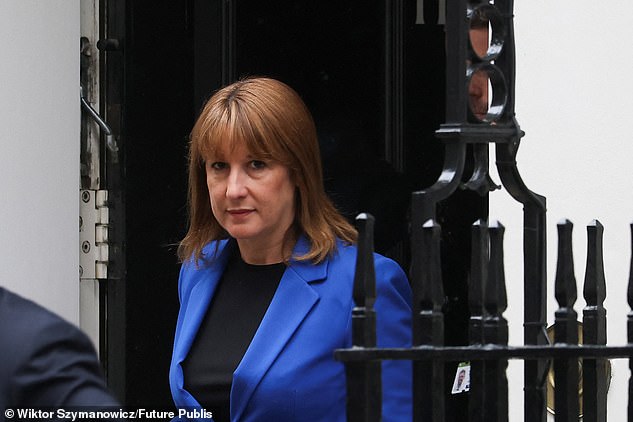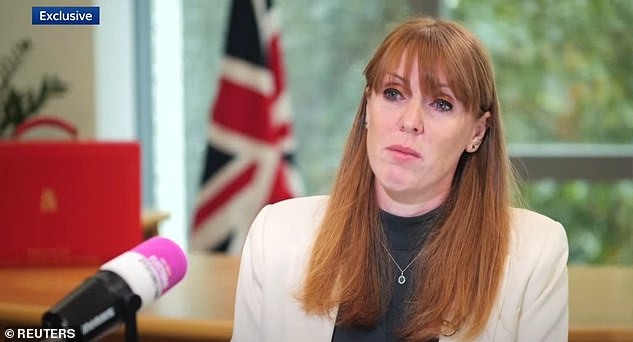Labour have lost their economic bearings so badly that they have only one way to get Britain out of this mess at the next Budget – by reversing course entirely.
To do that, though, Sir Keir Starmer and Rachel Reeves will have to abandon their dogmatic class-war principles.
They must start to lift the burden of high taxes, and take immediate action to stop the damage threatened by the departed Angela Rayner‘s ‘workers’ rights’ Bill.
It’s a tall order. But the alternative is beyond grim – a continued slide into stagnation, with rising prices tipping us over into full recession and worse.
The solution is staring our leaders in the face. We know it can work, because it has done before. Half a century ago, when I was about to take up my first professorship at Liverpool University, I was introduced to the newly elected leader of the Conservative Party, Margaret Thatcher.
Petty
Her chief economic guru, Alan Walters, happened to be my supervisor. In the run-up to Mrs Thatcher’s seismic 1981 Budget, and later as she tackled unemployment and labour market regulation, I was privileged to serve as one of her advisers.
Her courage and clear-sighted common sense lifted Britain out of an economic crisis even worse than the one afflicting us now.

Keir Starmer’s government needs to restore incentives for entrepreneurs to build and invest in businesses. Without this essential step, people with ambitions to make money will hang back or go elsewhere
Then, as now, growth is the answer. Starmer and Reeves do understand this, even though for reasons of petty politics they are unwilling to give Mrs Thatcher her due.
Liz Truss, during her brief tenure as PM, recognised the imperative need for growth, and generously cited my writings. But she lacked patience and political cunning, forgetting she was surrounded by enemies out to destroy her – a mistake Maggie never made.
The Iron Lady revived Britain’s entrepreneurial culture by cutting the top rate of income tax to 40 per cent and keeping corporation tax low. The economy responded by booming.
So what should Labour do now to nurse our economy back to health?
There are four key things.
First, they need to restore incentives for entrepreneurs to build and invest in businesses. Through punitive high taxes and red tape, successive governments have destroyed those incentives, and their actions need to be reversed.
Without this obvious and essential step, people with ambitions to make money will hang back or go elsewhere. And those who are brave enough to take the risks will be far more likely to fail.

Chancell Rachel Reeves’s decision to increase National Insurance payments for business owners at the last Budget has made it far more expensive to hire people
Second, we need a long-term commitment to sound finance, with the emphasis on getting people off benefits and into work.
Third, we need to recognise the importance of free markets as the long-term basis for any successful economy. That means ditching the Milibandist agenda for green energy at any price, which is doing so much damage.
It also means rejecting the insular, protectionist agenda coming from President Trump’s White House – and embracing free trade with the rest of the world.
Fourth, and most importantly, the overarching priority is to return to sound tax policy. Britain’s overall tax rate is now rising to a record 38 per cent of GDP, with the brunt of it falling on higher earners. Labour has surrendered to its age-old class hatred, setting ‘workers’ against ‘the bosses’.
Such prejudices belong in the dustbin of history. Everyone in Britain can help to create growth, by working and spending. But a thriving economy needs entrepreneurs. All entrepreneurs are driven by a desire to make money, of course, and there’s nothing wrong with that.
But there are two types – the ones who are already rich, and the ones who dream of being rich. We need both – and the tax system is disincentivising both of them.
A lifetime of economic research has taught me that a few ambitious people, starting with very little, are willing to take chances.
They run the risk of failure, of course, and many do fail – but they only bother providing there’s a good chance that they can reap the benefits if they succeed. Otherwise, what’s the point?
Such entrepreneurs, the ‘self-made’ men and women, are the rarer ones. The bulk of entrepreneurs are, in fact, people who already have wealth and use some of it to invest in new businesses. Money makes money, as the saying goes.
The risk of failure is lower for such people because, unless they have taken a suicidal plunge, their families won’t starve if a scheme doesn’t work out.
But high taxes are pushing these people out of the country – to Dubai, Italy and elsewhere. And they’re taking their wealth with them. Labour’s hateful class warriors are so blinded by ideology they’re actually glad to see them go. But that’s our national prosperity they are driving away.
Paymasters
Meanwhile, after the Chancellor endlessly talked down the economy, public confidence is low and people aren’t spending money freely. High streets are deserted and many restaurants are empty.
And on top of that, Reeves’s decision to increase National Insurance payments for business owners at the last Budget has made it far more expensive to hire people. And though Starmer would probably like to water down Rayner’s workers’ rights Bill, he will face the fight of his life against his paymasters the unions to do so.

Athough Starmer would probably like to water down Angela Rayner’s workers’ rights Bill, he will face the fight of his life against his paymasters the unions to do so
This bill, with its swathes of red tape and regulations, is expected to cost businesses £5billion a year, as well as making it more difficult to dismiss staff who perform poorly. Starmer must hold firm – and drop it.
Combined, all these factors are leading to a worrying long-term loss of growth.
It is the job of government to pursue policies that are right for the country, rather than lamely follow public opinion in search of popularity. But Starmer and Reeves, spooked by the success of Nigel Farage’s Reform party in the polls, are clutching at short-term fixes.
Priceless
Reform is supposedly on the political Right. Yet it is now swerving Leftwards on economic policy, promising large rises in benefits, more union rights, protectionism and nationalisation. It is unclear how any of this will be paid for.
Net Zero policies would be abolished, says Farage, and interest would not be paid on the Bank of England’s reserves, but these contributions fall far short of his programme’s costs.

If Starmer tries to edge away from Labour’s most self-destructive policies, such as on workers’ rights, he is likely to split the party. That, as Reform leader Nigel Farage predicted last week, could trigger an early General Election
If Starmer tries to edge away from Labour’s most self-destructive policies, such as on workers’ rights, he is likely to split the party. That, as Farage predicted last week, could trigger an early General Election.
Kemi Badenoch’s Conservatives therefore have a priceless opportunity to adopt a proven economic strategy. She has already taken a stride in the right direction by committing to renewed North Sea exploration for gas and oil.
She can capitalise on that by promising to withdraw the State from industry and let market forces direct Britain’s resources. Steel should not be nationalised and our railways must face open competition, with as many routes as possible put out to tender by private firms.
Above all, we need sane taxes that encourage growth. All those years ago, voters backed Margaret Thatcher again and again as she brought sense to our economy. They will back the Conservatives again if the same good sense is on offer.
- Patrick Minford CBE is professor of applied economics at Cardiff Business School












